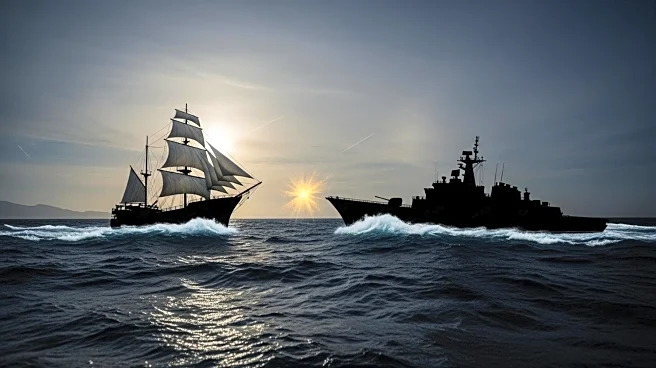What is the story about?
What's Happening?
Israeli Defense Forces (IDF) have intercepted the final vessel of the Global Sumud Flotilla, a group of 42 boats attempting to break the naval blockade of Gaza. The flotilla, carrying humanitarian aid and volunteers, aimed to challenge the blockade imposed by Israel. The interception marks the conclusion of the flotilla's efforts, with Israeli authorities beginning the deportation process for those involved. The flotilla's mission was to deliver aid and highlight the humanitarian situation in Gaza, but it faced resistance from Israeli naval forces, which have maintained a strict blockade citing security concerns.
Why It's Important?
The interception of the Global Sumud Flotilla underscores the ongoing tensions surrounding the Gaza blockade, a contentious issue in international politics. The blockade has been criticized by various human rights organizations for exacerbating the humanitarian crisis in Gaza. The flotilla's attempt to break the blockade highlights the persistent efforts by activists to draw attention to the plight of Gaza's residents. The IDF's actions reflect Israel's security priorities, but also raise questions about the balance between security and humanitarian needs. This event may influence international discourse on the Israeli-Palestinian conflict and impact diplomatic relations.
What's Next?
Following the interception, Israeli authorities are proceeding with the deportation of the flotilla's participants. This action may provoke responses from international human rights groups and governments sympathetic to the Palestinian cause. The incident could lead to increased advocacy and pressure on Israel to reconsider its blockade policies. Additionally, it may prompt further flotilla attempts or other forms of protest, as activists continue to seek ways to support Gaza. The situation remains dynamic, with potential diplomatic repercussions depending on international reactions.
Beyond the Headlines
The interception of the flotilla raises broader ethical questions about the rights of activists and the responsibilities of states in conflict zones. It highlights the challenges faced by humanitarian efforts in politically sensitive regions. The event may also influence public opinion and media coverage, shaping perceptions of the Israeli-Palestinian conflict. Long-term, it could affect policy discussions on international humanitarian law and the rights of civilians in conflict areas.
















